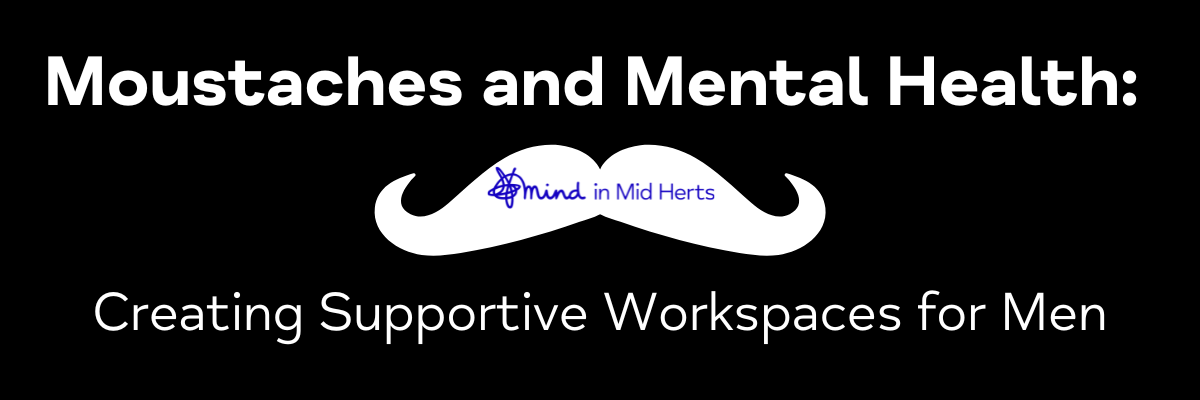Moustaches and Mental Health: Creating Supportive Workspaces for Men
Supporting Men’s Mental Health at Work During Movember and Beyond
As the weather turns colder and the moustaches grow longer, Movember serves as an important reminder that men’s mental health deserves as much attention as their physical health. For many men, opening up about mental health challenges can be difficult due to stigma, societal expectations, and cultural norms around masculinity. As a result, male mental health issues often go unnoticed and untreated. However, the workplace can play a key role in changing that. This article explores why men’s mental health is so important and how employers can support their male employees during Movember and beyond.
The State of Men’s Mental Health
Poor mental health affects both men and women, but experiences and coping methods can differ. The statistics speak volumes:
- Three out of four suicides in the UK are by men.
- Men are less likely than women to access psychological therapies.
- Societal pressure to “tough it out” often leads men to internalise struggles rather than seek help.
These statistics highlight an opportunity for positive change, especially in workplaces where employers can foster environments that promote mental health and well-being.
Why is the Workplace Important?
Since adults spend a significant portion of their time at work, the workplace can either add to daily pressures or become a supportive space. Employers have a responsibility—and an opportunity—to support employees’ mental health. By doing so, they can improve productivity, reduce absenteeism, and foster a more positive workplace culture.
How Employers Can Support Male Employees’ Mental Health
1. Normalise Mental Health Conversations
To start, it’s crucial to open a dialogue around men’s mental health. Initiatives like Movember are excellent starting points, but conversations need to extend beyond just one month. Employers can:
- Invite mental health professionals for talks or workshops.
- Provide resources on men’s mental health, covering topics like recognising signs of stress, anxiety, or depression.
- Share personal stories of recovery from employees or external speakers to help break down stigma.
2. Promote Flexible Work Options
Work-life balance is key to mental well-being. Flexible work arrangements, such as remote work or compressed workweeks, help reduce stress and allow men to focus on family or personal well-being without sacrificing career progress.
3. Provide Access to Confidential Mental Health Support
Employers can offer access to Employee Assistance Programmes (EAPs) that provide counselling services. Ensure employees know about these resources and feel comfortable using them. Partnering with mental health charities can provide additional support tailored to men’s well-being.
4. Train Managers on Mental Health Awareness
Managers who recognise signs of poor mental health—like changes in mood or increased absenteeism—can create early intervention opportunities. Training managers to have open, compassionate conversations and direct team members to resources is essential.
5. Build Peer Support Networks
Men often respond well to peer support, where they can speak openly without judgment. Employers can set up peer support groups or mentorship programmes to create a safe space for sharing experiences. Mental health champions within the company can also encourage open discussions.
6. Support Mental Health Initiatives like Movember
Movember is an ideal time to encourage participation in mental health initiatives. Employers can hold webinars, social events, or fundraisers to raise awareness for men’s mental health. Engaging all employees fosters a sense of community.
7. Create a Supportive Workplace Culture
A healthy workplace culture encourages employees to prioritise well-being over “powering through” stress. By promoting open conversations and valuing mental health, employers can create an environment where everyone feels supported.
Top Ways to Support Men’s Mental Health in the Workplace
- Normalise conversations about mental health.
- Promote flexible work options.
- Offer access to confidential mental health resources.
- Train managers to recognise signs of poor mental health.
- Create peer support networks.
FAQs
What is Movember, and how does it support men’s mental health?
Movember is an annual event where men grow moustaches in November to raise awareness and funds for men’s health, including mental health and suicide prevention.
Why is men’s mental health important in the workplace?
Men’s mental health is essential to address in workplaces because it affects productivity, well-being, and overall workplace morale. Supporting mental health can reduce absenteeism and enhance job satisfaction.
How can employers support men’s mental health?
Employers can support men’s mental health by normalising conversations, offering flexible work, providing access to mental health resources, training managers, and fostering peer support.
Supporting mental health is not just the right thing to do; it’s also beneficial for business.
Research shows that workplaces with robust mental health support see reduced absenteeism, increased productivity, and improved employee retention.
Movember reminds us that men’s mental health needs ongoing attention, but this is just the start. By implementing these strategies, employers can create a supportive, inclusive workplace where all employees feel encouraged to speak up. Together, we can break down stigma and make mental health support accessible for everyone.
Elevate Your Team’s Wellbeing – Contact Us Today!
At Mind in Mid Herts, we believe in the transformative power of fostering a healthy work environment that prioritises mental wellbeing. Our goal is to empower businesses in Hertfordshire to create workplaces where every employee feels supported, understood, and valued.
We offer a range of services to support workplace wellbeing, including consultancy, mental health awareness training, and support for individuals.
To learn more about how we can support your workplace wellbeing initiatives, explore our Workplace Wellbeing Getting Started page.
Together, we can create a healthier, more supportive work environment for everyone.
Sources:
Posted on: 7th November 2024



